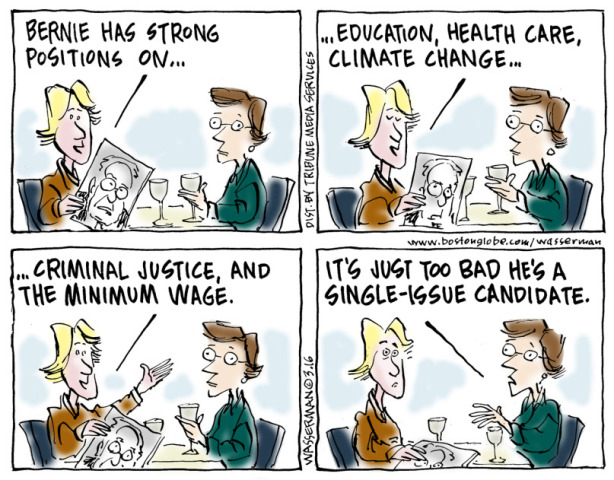
International trade is back on the political agenda. Clearly, both Donald Trump and Bernie Sanders owe at least some of the support they’ve received in recent primaries to their criticisms of U.S. trade deals and their effects on American workers. It’s also clear that Bernie Sanders, in particular, is being widely criticized—by Hillary Clinton and the mainstream media—for his long-standing opposition to those deals.
The debate about international trade is, of course, not a new one. It’s been a contentious topic throughout the history of capitalism—from the Corn Laws to the Trans-Pacific Partnership—among economists and in politics.
My own view, for what it’s worth, is that capitalism and free international trade are not identical. There is no necessary correspondence between them. Historically, there are plenty of examples—in the United States and around the world—when capitalists have demanded and received protectionist barriers against the competitive pressures of capitalists in other countries.
However, right now, in this particular conjuncture in the United States, especially when wages for American workers are being held down, capitalism and free international trade do go hand in hand. U.S. capitalists have demanded and received a lowering of protectionist barriers around the world—through the alphabet soup of agreements, including the WTO, NAFTA, and the TPP—in order to sell more commodities, purchase cheaper inputs for the production of those commodities, and to protect their intellectual property rights.
The existence of low wages for American workers is both a condition and consequence of these trade agreements. It’s a condition to the extent that, with stagnant wages and slowly growing consumption, U.S. businesses often look abroad to sell the commodities they produce. And it’s a consequence in the sense that cheap imports and corporate decisions to relocate production abroad negatively affect the wages and working conditions of American workers.
So, there’s a problem with international trade, which workers in Michigan and elsewhere have every right to be concerned about.
But the problem is not just with trade. It’s capitalism, too. Or, to put it differently, it’s capitalist trade that’s the problem.
That’s because capitalism means that capitalists get to appropriate the surplus and do with it what they want. They get to decide when and where commodities will be produced, and therefore when and where jobs will or will not be created. If that means offshoring production or purchasing inputs from producers in other countries in order to boost profits, workers in the United States will either lose their jobs or be forced to accept lower wages and fewer benefits in order to “compete” with the production of commodities elsewhere.
It’s true that workers in other countries may, at the same time, see more jobs and higher wages. Focusing only on trade (as Trump is doing) pits workers in one country against workers in other countries. That’s the right-wing economic nationalism we’ve been hearing during the Republican primaries.
Focusing on capitalist trade, on the other hand, highlights the individual, private ability of capitalists to utilize the surplus as they see fit, which can often decimate groups of workers, their families, and the communities in which they live—because, in the context of international trade, capitalists are able to source both production and purchasing whenever and wherever it is most profitable. They’re making rational, private decisions that have irrational, economic and social effects.
That’s why, in the current climate, it’s both capitalism and international trade we need to be concerned about.

















